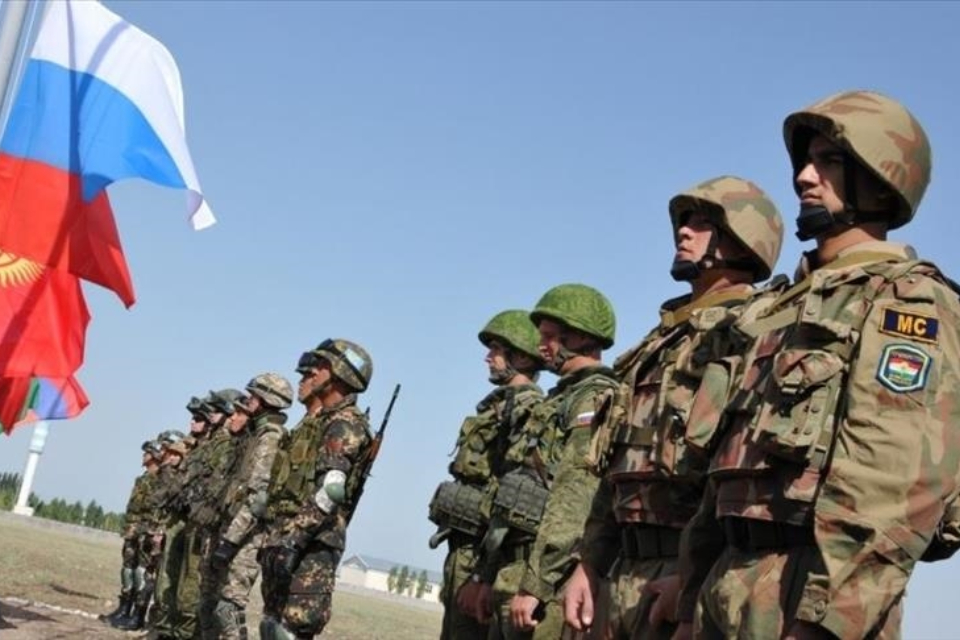Armenia, Kyrgyzstan and Kazakhstan have refused to hold the Collective Security Treaty Organization exercises. The Collective Security Treaty Organization is a military block led by Russia.
Image: CSTO drills, source: www.aa.com.tr
The Defense Ministries of the countries reported that they canceled military exercises that were to be held jointly with Russia in mid-October.
Collective Security Treaty Organization – military bloc with nearly no cooperation inside
The Collective Security Treaty Organization, created from the wreckage of the USSR, is now a unique military bloc. The country in whose capital the agreement to form the military bloc was made is no longer a member; two of the six member states are actually at war with other states, but fighting with their own forces; two others are constantly at war with each other. What kind of organization is it and does it have any future?
Kyrgyzstan unilaterally canceled joint military drills a day before the start
Kyrgyzstan unilaterally canceled joint military drills between the six nations comprising the Moscow-led Security Treaty Organization, less than a day before they were due to start on its territory.
The Kyrgyz defense ministry did not specify the reason for canceling the exercises, which were set to be held in the country’s eastern highlands. The move by Kyrgyzstan is the latest indication that tensions may be simmering within the alliance, formed in the early 1990s.
Unbreakable Brotherhood 2022 exercises were planned in Kyrgyzstan for October 10-14
Kyrgyzstan has been reluctant to carry out peacekeeping exercises of this organization on its territory. A command-staff exercise called Unbreakable Brotherhood 2022 was to have been held in Issyk-Kul Oblast from October 10-14, but was canceled without any reason given.
The CSTO includes Russia, Armenia, Belarus, Kazakhstan, Kyrgyzstan and Tajikistan. The exercise in the town of Balykchy, Issyk-Kul Oblast, was planned to practice securing a ceasefire. However, fewer members seem to believe in the ability of CSTO forces to enforce the ceasefire. For example, in late September, Armenia refused to participate in a CSTO exercise in Kazakhstan.
Armenia refused to join Russia-led exercises
This time, Armenia also decided not to attend military drills that the Russian-led Collective Security Treaty Organization is, citing persistent concerns along its border with Azerbaijan. The Armenian Defense Ministry said in a statement that the decision to send Armenian forces to the drills was made in light of “the situation on the Armenian-Azerbaijani border that emerged as a result of Azerbaijan’s military aggression”, Infocom.am reported. According to the statement, the ministry considered “tasks established for the Armenian Armed Forces” in light of the current circumstances.
Many countries in the bloc are dissatisfied with the CSTO’s activities or lack of any effective measures. Indeed, when military assistance is needed by a country-member, nothing happens, the CSTO refuses to intervene.
In September, hours after new hostilities with Azerbaijan erupted, Yerevan filed a request for military assistance, which Russia and the other CSTO nations effectively rejected and limited their response to by sending fact-finding missions to the border. Armenian authorities said that the Azerbaijani government in Baku had attacked positions of the Armenian army with heavy artillery and combat drones. But the organization refused to send any assistance.
In mid-September, a rally took place in Yerevan demanding that Armenia withdraw from the Collective Security Treaty and start negotiations with new allies. The reason was the CSTO’s passive response to Armenia’s request to send troops into the zone of clashes with Azerbaijan, which resumed on the night of 12-13 September.
CSTO – Russia’s influence tool that disappears
Many experts point out that the CSTO has become a tool for Russia to maintain its military influence and remind us that Moscow’s ‘help’ has to be paid for. As an example, the situation in Belarus is often cited, whose head, Alexander Lukashenko, whom the Kremlin helped to retain power in 2020, fulfills all of Vladimir Putin’s wishes, including providing the country’s territory for Russia’s attacks against Ukraine.
Apart from Lukashenko, none of the leaders of the CSTO member states has supported the Russian invasion of Ukraine, and this has angered Russian supporters of the war. They call the organization a screen under cover of which the allies “cooperate with Russia’s enemies”.
So, having these conditions, Russia cannot achieve a united position among the “allies” (apart from Belarus) on the issue of confrontation with the West. At the UN General Assembly only Minsk voted against the resolution condemning Russia for its war against Ukraine, the rest of the “allies” quietly abstained.
Armenia’s motivation is clear. Yerevan was abandoned with no help, facing the Azerbaijani aggression. Kazakhstan, Kyrgyzstan and Tajikistan have other issues: a wave of radical Islam is booming in the republics. In addition, Turkey’s presence and influence is felt in the region as well.
The outlaw of the civilized world
Russia’s international reputation after it launched a cruel war against Ukraine is unacceptable to such an extent that many CSTO members started distancing themselves from Moscow. At this time, Russia will find it difficult to find any new allies in the region, and will become more and more isolated, an outlaw of the civilized world.

